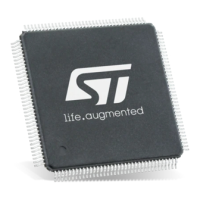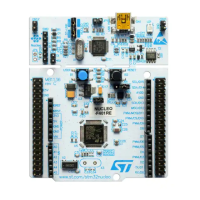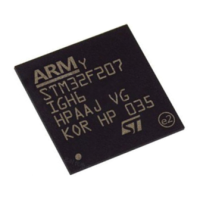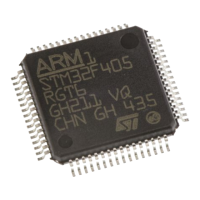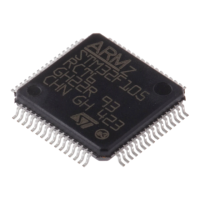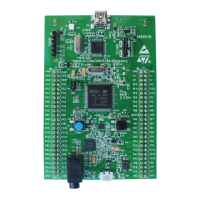The STM32 Cortex-M0 processor PM0215
20/91 Doc ID 022979 Rev 1
2.2.3 Behavior of memory accesses
The behavior of accesses to each region in the memory map is:
The Code, SRAM, and external RAM regions can hold programs.
2.2.4 Software ordering of memory accesses
The order of instructions in the program flow does not always guarantee the order of the
corresponding memory transactions. This is because:
● The processor can reorder some memory accesses to improve efficiency, providing this
does not affect the behavior of the instruction sequence.
● Memory or devices in the memory map have different wait states
● Some memory accesses are buffered or speculative.
Section 2.2.2: Memory system ordering of memory accesses on page 19 describes the
cases where the memory system guarantees the order of memory accesses. Otherwise, if
the order of memory accesses is critical, software must include memory barrier instructions
to force that ordering. The processor provides the following memory barrier instructions:
Table 11. Memory access behavior
Address
range
Memory
region
Memory
type
(1)
1. See Memory regions, types and attributes on page 19 for more information.
XN
(1)
Description
0x00000000-
0x1FFFFFFF
Code Normal -
Executable region for program code. Can also put
data here.
0x20000000-
0x3FFFFFFF
SRAM Normal -
Executable region for data. Can also put code
here.
0x40000000-
0x5FFFFFFF
Peripheral Device XN External device memory
0x60000000-
0x9FFFFFFF
External
RAM
Normal - Executable region for data.
0xA0000000-
0xDFFFFFFF
External
device
Device XN External device memory
0xED000000-
0xED0FFFFF
Private
Peripheral
Bus
Strongly-
ordered
XN
This region includes the NVIC, System timer, and
system control block. Only word accesses can be
used in this region.
0xED100000-
0xFFFFFFFF
Device Device XN
This region includes all the STM32 standard
peripherals.
DMB The Data Memory Barrier instruction ensures that outstanding memory transactions
complete before subsequent memory transactions. See DMB on page 63.
DSB The Data Synchronization Barrier instruction ensures that outstanding memory
transactions complete before subsequent instructions execute. See DSB on
page 63.
ISB The Instruction Synchronization Barrier ensures that the effect of all completed
memory transactions is recognizable by subsequent instructions. See ISB on
page 64.
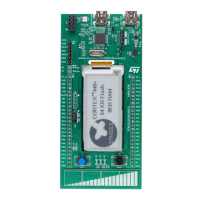
